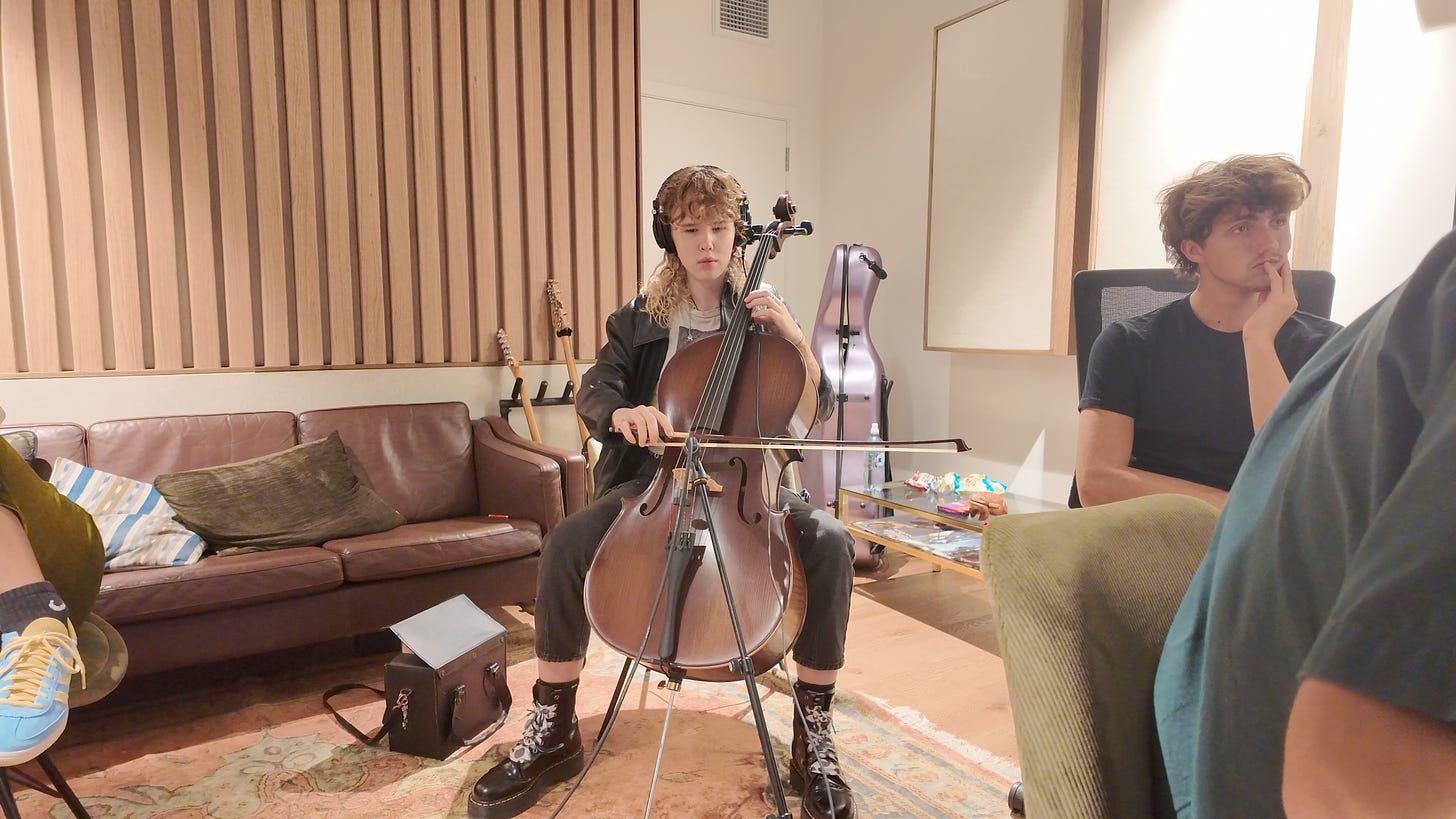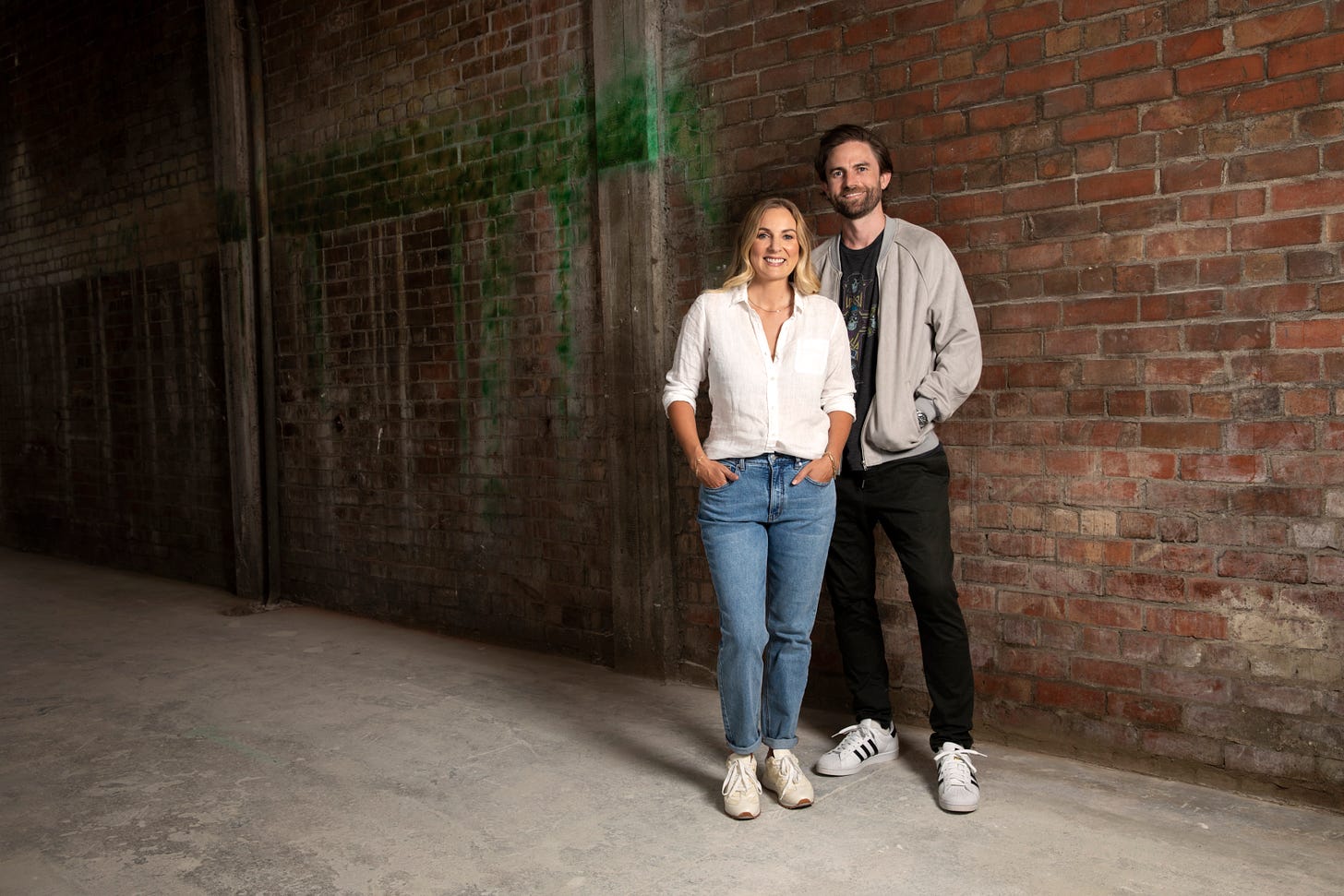After months of delays, Big Fan finally takes flight.
A busy day at Joel Little's Morningside studio, where the kids prove they're OK.
Evangeline* has just discovered she can scream. “I’ve been taking online lessons,” the 16-year-old says. “But I didn’t want to scream in my bedroom and scare my family.”
In studio three at Big Fan, a not-for-profit community music space in the Auckland suburb of Morningside, Evangeline has been perfecting her scream, nailing take after take of a grinding gut howl.
For her new song, she’s paired it with downtuned death metal guitars inspired by the Ukrainian metalcore act Ginger. “I’m really proud of the screaming in this one,” she says, pressing play. “I’m letting it all go.”
As speakers blast her lyrics – “Crawl off like a stray dog / Make a necklace with her bones” – the St Cuthbert’s College Year 12 student admits her aggression has a target. “It’s about someone I’m really angry at.”
Normally, Evangeline’s family hears the soothing sound of a cello, her instrument of choice since the age of 3, coming out of her bedroom. Now, at 16, she’s finding her musical horizons expanding, and is worried about what her parents might think.
“My mum's going to be like, ‘That's really cool’,” she says. “My dad's probably going to make me go to church more … He thinks Fall Out Boy is heavy metal.”
Soon, her parents, and those of everyone else working in Big Fan’s three studios, will arrive to hear what their kids have been doing for the week.
It’s Friday afternoon at the end of Fan Camp Rangatahi, a project aimed at enticing budding musicians into Big Fan for a full week of mixing, mingling and music-making.
I’ve been invited along to hear the results. Created by super-producer Joel Little and his wife Gemma, I first toured Big Fan – a mix of studios, lounges and a live music venue on McDonald Street – in late 2021, back when it was still a building site.
Gemma had found the building for sale on TradeMe while browsing late one night. She showed it to her husband, the Grammy-winning musician behind Lorde’s ‘Royals’, who’d been dreaming of building a music facility everyone could enjoy. He replied: “Fuck it, let’s buy this building, let’s do it.”
Things didn’t go to plan. By the time Little gave me a tour, Big Fan was already behind schedule. “It’s definitely a bigger job than we thought it would be,” he admitted. We wore fluorescent vests and hard hats. Exposed wires dangled from ceilings, and walls were being fixed in place. Since then, further setbacks delayed Big Fan’s official opening to November, 2022.
Even now, they’re still waiting for boxes to be ticked. Mostly, though, it’s up and running as intended. Each studio is acoustically calibrated, full of instruments, mixing boards, chairs and computers, ready for artists to do their thing. The downstairs venue is in action most nights. Little might be in Los Angeles on the day I visit, but his own studio – dubbed Little Fan – is humming away.
Music is being made behind every door, and Fan Camp helps fulfill Little’s desire for Big Fan used by as many members of the music community as possible. He hopes to mentor the artists of tomorrow. “I’ve had people help me all the way through my career,” Little told me. “It feels nice to hopefully be that person for someone else.”
So, for an entire week, his studios are taken over by nine students who support each other as they create as much music as possible. By the end of the week, each is expected to emerge with two original songs and some idea of whether or not they want to take this music thing any further.
In studio two, a very different noise is coming out of the speakers than that being made by Evangeline. It’s a Motown-style track inspired by Marvin Gaye and Lauryn Hill, one smothered in the kind of jaded and world-weary vocals that remind of Amy Winehouse.
That voice is coming from Milla*, who, at just 13, is the youngest Fan Camp attendee. She’s flown in from Sydney to be here, and says her song, sweet and soulful with a snarky bite, is about “being stuck in a small place when you know you should be somewhere bigger”.
Her inspiration came from lockdowns, when her family returned to New Zealand to wait out Covid restrictions in a small town. “It was good for a while,” she says. “But I just wanted to go back to the city.”
In studio one, Malaika*, a 17-year-old student from Golden Bay High School, has already banked two “gothic folk-pop” songs. Today, she’s also collaborating with Maggie Burke*, from Mangawhai, and Charlie Heath*, the son of Deja Voodoo’s Matt Heath and Elemeno P’s Lani Purkis. They’re making a silky synth-pop number reminiscent of Passion Pit.
Malaika received an invite to attend Fan Camp after playing Little her music. In Tākaka, her musical options are limited. “I’m the only person in my age group who is musically inclined,” she says. She only knows of one other musician. “There’s one guy who pretends to do reggae music. He talks in an accent … I thought he might grow out of it but no, he’s fully grown.”
Outside, in Big Fan’s lounge, chips and chocolates are poured into bowls, drinks chill in the fridge and speakers crackle to life. Soon, the families of these nine teens will arrive, find a spot and sit down. Then, they’ll hear the results of a week’s worth of work, a motley collection of alt-rock, death metal, smoky 60s-indebted pop, gothic folk, synth-driven dance and more, from a collection of artists who could soon land on a radio, chart, streaming service or venue near you.
Will any of them keep making music? Malaika says her previous ambition was to study English. Now, she’s fully caught the music bug. “After being so immersed in music for a week, I realise it’s possible,” she says. “I could say to myself, ‘I want to be a musician,’ and not be worried about it.”
* Last names withheld to avoid identification.
Thanks for reading Boiler Room. If you’d like to receive more of my regular instalments in your inbox, sign up below. This is a reader-supported newsletter, so if you’d like to keep this thing going, you can use this button too.
Everything you need to know…
What really happened when Internal Affairs Minister Brooke Van Velden stepped in to help a Wellington DJ get a quickfire Visa approved for an Australian show with dance titan Fred Again? The NZ Herald fired off an Official Information Request, received her text messages and found the minister told her staff one thing, and the media something else entirely.
Over two eye-opening pieces, The Guardian has been investigating just how tough smaller artists are finding it to make money out of their music, especially when it comes to touring. In the first, several acts told the publication they often came back from tour with less money than they started. In the second, some say it’s even worse: they’re skipping meals to survive.
It’s hard to believe some of the festival line-ups coming out of America right now. Take, for example, Bridgeport’s Soundside, where organisers have put Goo Goo Dolls, Fleet Foxes and Boyz II Men on the same bill. WTF? So it’s pleasing to see San Francisco’s Portola festival deliver something far more cohesive: Justice, Gesaffelstein, M.I.A, Four Tet and Jamie xx. The full list is here. (Anyone wanna book tickets with me?)
Finally, tickets for the New Zealand leg of Donald Glover’s hip-hop project Childish Gambino go on pre-sale today, and they look likely to be pretty damned pricey – $199 for GA, and up to $489 for some seats, according to this. Will it be worth it? Only if they get the sound mix right. While you decide, enjoy the video for ‘Little Foot Big Foot’, the first single from Glover’s surprise album released on Tuesday. Great video! (Could he please put more effort into his music though?)











For as long as I've been making music, indie bands have lost money and weight on tour. That's why we had the dole, really, so that original musos, those not in debt to record companies, had a fighting chance, but the dole isn't what it used to be because rent is now so huge a commitment it needs its own dole (think about that).
If people are being sold the idea that learning to make music is a way to make money, a form of capitalist enterprise, for all but a lucky or privileged few, that's one of those "misinformations" we hear so much about. It's an idea being spread by people with something to sell, and that's because they can make better money selling lessons, apps, playlists, admin and encouragement than they can make selling music.
The musos in that article are right that it's become a game for rich kids. Rich kids used to be less of a threat because rock was considered low art by the rich and being rich was considered uncool by the rockers.
In the first case, popular music has become a victim of its own success and its successful mythologizing by the music press. In the second case, it's become a victim of some neo-liberal "greed is good" fall-out. I refer you to Vorn's comparison of Prince in Purple Rain (doing anything for the money is uncool - 1984) to Jay Z (I'm cool mainly because I make lots of money - 2001ish), but only if you're a paid subscriber to Simon Sweetman's Sounds Good archive, otherwise following this link is just annoying.
https://simonsweetman.substack.com/p/five-films-that-stay-with-me-vorn-colgan?utm_source=publication-search
It's also the case that a music career in the past was low-investment, in that the preparation for it only involved playing music for fun as much as possible. Of all the UK rock musicians of the classic eras, only Mick Jagger had a tertiary education, and that was in an unrelated field (then , not now), economics. No-one had paid for a degree in it, or anything more expensive than a few piano or guitar lessons. People worked within their limitations, and that challenge was the source of both innovation and meaning. Today, if the higher ranks are dominated by the rich, the middle ranks belong to the professional managerial class.
I'm only really interested in the exceptions, the freaks*, the true punks. The people who never had any other option.
* This is a plug for Luke Haine's great new book, which attacks the problem head on and in detail.
https://www.roughtrade.com/en-gb/product/luke-haines/freaks-out-weirdos-misfits-and-deviants-the-rise-and-fall-of-righteous-rock-n-roll
Shiiiit - this quote from the Guardian article is brutal: "It’s a hobby that just about pays for itself."